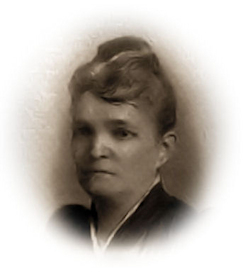Vicksburg, May 1st, 1863.—Ever since we were deprived of our cave, I had been dreading that H. would suggest sending me to the country, where his relatives live. As he could not leave his position and go also without being conscripted, and as I felt certain an army would get between us, it was no part of my plan to be obedient. A shell from one of the practicing mortars brought the point to an issue yesterday and settled it. Sitting at work as usual, listening to the distant sound of bursting shells, apparently aimed at the court-house, there suddenly came a nearer explosion; the house shook, and a tearing sound was followed by terrified screams from the kitchen. I rushed thither, but met in the hall the cook’s little girl America, bleeding from a wound in the forehead, and fairly dancing with fright and pain, while she uttered fearful yells. I stopped to examine the wound, and her mother bounded in, her black face ashy from terror. “Oh! Miss G., my child is killed and the kitchen tore up.” Seeing America was too lively to have been killed, I consoled Martha and hastened to the kitchen. Evidently a shell had exploded just outside, sending three or four pieces through. When order was restored I endeavored to impress on Martha’s mind the uselessness of such excitement. Looking round at the close of the lecture, there stood a group of Confederate soldiers laughing heartily at my sermon and the promising audience I had. They chimed in with a parting chorus:
“Yes, it’s no use hollerin’, old lady.”
“Oh! H.,” I exclaimed, as he entered soon after, “America is wounded.”
“That is no news; she has been wounded by traitors long ago.”
“Oh, this is real, living, little, black America. I am not talking in symbols. Here are the pieces of shell, the first bolt of the coming siege.”
“Now you see,” he replied, “that this house will be but paper to mortar-shells. You must go into the country.”
The argument was long, but when a woman is obstinate and eloquent, she generally conquers. I came off victorious, and we finished preparations for the siege to-day. Hiring a man to assist, we descended to the wine-cellar, where the accumulated bottles told of festive hours long since departed. To empty this cellar was the work of many hours. Then in the safest corner a platform was laid for our bed, and in another portion one arranged for Martha. The dungeon, as I call it, is lighted only by a trap-door, and is very damp. The next question was of supplies. I had nothing left but a sack of rice-flour, and no manner of cooking I had heard or invented contrived to make it eatable. A column of recipes for making delicious preparations of it had been going the rounds of Confederate papers. I tried them all; they resulted only in brick-bats, or sticky paste. H. sallied out on a hunt for provisions, and when he returned the disproportionate quantity of the different articles provoked a smile. There was a hogshead of sugar, a barrel of sirup, ten pounds of bacon and pease, four pounds of wheat-flour, and a small sack of corn-meal, a little vinegar, and actually some spice! The wheat-flour he purchased for ten dollars as a special favor from the sole remaining barrel for sale. We decided that must be kept for sickness. The sack of meal, he said, was a case of corruption, though a special providence to us. There is no more for sale at any price, but, said he, “a soldier who was hauling some of the Government sacks to the hospital offered me this for five dollars, if I could keep a secret. When the meal is exhausted, perhaps we can keep alive on sugar. Here are some wax candles; hoard them like gold.” He handed me a parcel containing about two pounds of candles, and left me to arrange my treasures. It would be hard for me to picture the memories those candles called up. The long years melted away, and I
“Trod again my childhood’s track
And felt its very gladness.”
In those childish days, whenever came dreams of household splendor or festal rooms or gay illuminations, the lights in my vision were always wax candles burning with a soft radiance that enchanted every scene…. And, lo! here on this spring day of ‘63, with war raging through the land, I was in a fine house, and had my wax candles sure enough, but, alas! they were neither cerulean blue nor rose-tinted, but dirty brown; and when I lighted one, it spluttered and wasted like any vulgar, tallow thing, and lighted only a desolate scene in the vast handsome room. They were not so good as the waxen rope we had made in Arkansas. So, with a long sigh for the dreams of youth, I return to the stern present in this besieged town, my only consolation to remember the old axiom, “A city besieged is a city taken,”–so if we live through it we shall be out of the Confederacy. H. is very tired of having to carry a pass around in his pocket and go every now and then to have it renewed. We have been so very free in America, these restrictions are irksome.
Note: To protect Mrs. Miller’s job as a teacher in post-civil war New Orleans, her diary was published anonymously, edited by G. W. Cable, names were changed and initials were generally used instead of full names—and even the initials differed from the real person’s initials. (Read Dora Richards Miller’s biographical sketch.)
